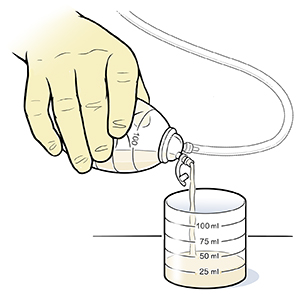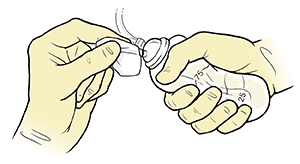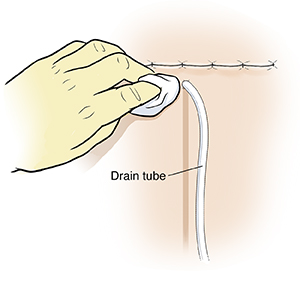Caring for a Closed Suction Drainage Tube
A drainage tube removes fluid from around an incision. This helps prevent infection and promotes healing. The collection bulb at the end of the tube is squeezed and plugged to create suction. The bulb should be emptied and reset when half full to maintain adequate suction. You need to empty the bulb and clean the skin around the drain as often as your healthcare provider tells you to. Follow the steps you were taught in the hospital, including how to measure and keep track of how much fluid is coming out of the drain, or how to flush the tube if needed. Follow your healthcare team's specific instructions.



Supplies
Have the following items ready:
-
Disposable gloves
-
Measuring cup
-
Record sheet
-
Gauze or paper towel
-
Sterile cotton swabs or 4-inch x 4-inch gauze pads
-
Sterile saline or soap and water
When to call your healthcare provider
Call your healthcare provider if you notice any of these changes:
-
The amount of fluid increases or decreases suddenly
-
Large amount of blood or a clot in drainage
-
Color, odor, or thickness of the fluid changes
-
Tube falls out or the incision opens
- The stitch that holds the drain in place falls out, or is no longer attached to the drain.
-
Skin around the drain is red, swollen, painful, or seeping pus
-
You have a fever of 100.4°F ( 38°C ) or higher, or as directed by your healthcare provider
- Chills
Tips
Here are tips to drain the tube:
-
Uncurl any kinks in the tube.
-
With one hand, firmly hold the base of the tube between your thumb and index finger. Don't touch the incision.
-
Put the thumb and index finger of your other hand on the tube, next to the first hand. Pinch your fingers together. Then pull them along the tube toward the bag. This will help push any clogged fluid through the tube. This is called stripping the tube. You may find it helpful to hold an alcohol swab between your fingers and the tube to lubricate the tubing.
-
If the tube still does not drain, call your healthcare provider.